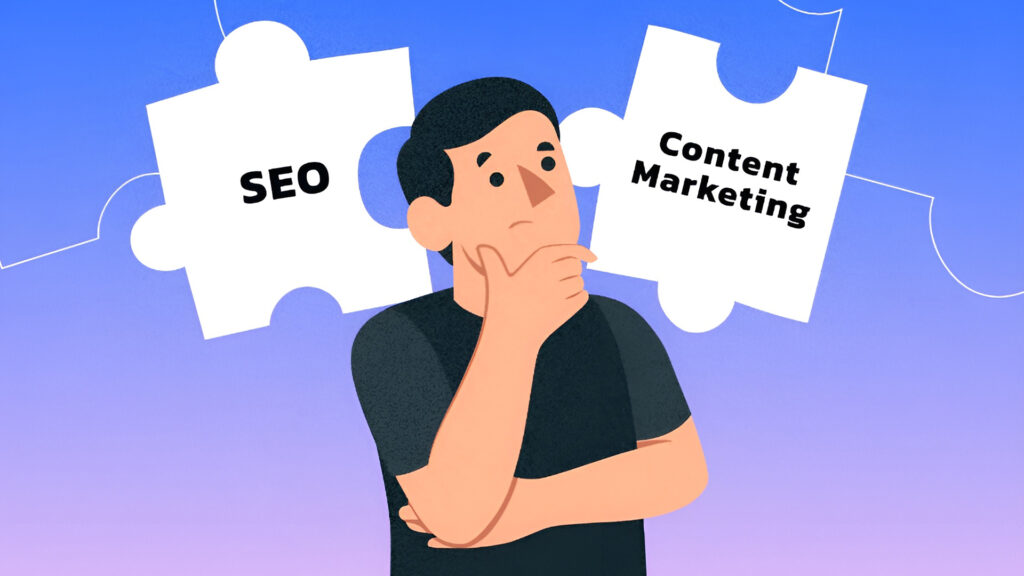Content Marketing vs SEO: What’s the Difference?

Table of Contents
Ever wonder why some websites appear first on Google while others remain hidden? Or why do some blog posts get all the clicks while others go unnoticed? The answer often lies in the battle of content marketing vs SEO. These two powerful tools may appear similar, but they serve distinctly different roles. In this guide, you’ll discover what sets them apart, how they work together, and why using both is key to growing your website.
What Is Content Marketing?

Content marketing involves creating useful, helpful, and engaging content for your target audience. This can be blog posts, videos, infographics, podcasts, social media posts, and more. The goal is to attract people to your brand and keep them engaged.
Good content marketing:
- Answer your audience’s questions.
- Builds trust with your readers.
- Helps your brand establish itself as an expert in its field.
For example, if you run a travel website, writing a blog titled “Top 10 Places to Visit in Europe” is content marketing.
Real-Life Example: HubSpot’s Content Marketing Success
A notable content marketing case study is HubSpot, a company that specializes in marketing software. They utilized content marketing to expand their business by creating free blog posts, eBooks, guides, and videos that helped marketers and small businesses. They answered common questions like “What is inbound marketing?” and “How to get more leads?”
What Is SEO?
SEO, or Search Engine Optimization, is the process of making your website better for search engines like Google. When you use the right keywords, improve your website’s speed, and create quality content, you help your site show up higher in search results.
Some parts of SEO include:
- Using the right keywords.
- Optimizing images and headings.
- Getting links from other websites.
- Making your site mobile-friendly.
When someone searches “best travel spots in Europe,” they see many results. If your blog appears at the top, that means SEO is working.
Useful SEO Tools
Here are some tools that can help you with SEO:
- Google Search Console – to track how your site performs on Google
- Ahrefs – to find keyword ideas and check backlinks
- SEMrush – to analyze your SEO and see what your competitors are doing
- Yoast SEO (for WordPress) – to help you optimize your blog posts easily
- Ubersuggest – for simple keyword research and SEO tips
Content Marketing vs SEO: Key Differences
Feature/Aspect | Content Marketing | SEO (Search Engine Optimization) |
Main Focus | Focuses on what you say and the value of your message | Focuses on how you say it and how your content is discovered online |
Goal | To educate, entertain, or inform the audience | To improve rankings in search engines like Google |
Approach | Storytelling, tips, how-to guides, engaging formats | Keyword usage, meta tags, site speed, backlinks, mobile-friendliness |
Content Type | Blogs, videos, infographics, podcasts, social media posts | Web pages, blogs with keywords, and technical site content |
Platform | Can be shared across multiple platforms (website, YouTube, social media, etc.) | Mainly affects website visibility and structure |
User Relationship | Builds trust and long-term relationships with the audience | Helps users find your site through relevant searches |
Technical Requirements | Usually low – more focused on creativity and messaging | High – includes technical fixes, HTML tags, and backend optimization |
Time to See Results | Long-term – content grows in value over time | Can bring short- or long-term results depending on strategy |
Dependency | Needs SEO to reach a wider audience | Needs content to have something to optimize |
Measurement Metrics | Engagement, shares, time spent on content, leads | Click-through rate, rankings, traffic from search engines |
How Does SEO and Content Marketing Work Together?

Although SEO and content marketing are distinct, they work best when combined. The relationship between SEO and content marketing is strong because they complement each other in their growth.
Here is how they work together:
- You write a helpful blog post that answers questions or shares useful tips. This is content marketing because you do something valuable to your readers.
- You add the right keywords that people are searching for. This is SEO because it helps search engines understand the content of your blog.
- Ensure the blog loads quickly, looks good on phones, and is easy to read. This is part of SEO because it enhances the user experience on your website.
- You share your blog on social media, through emails, or on other websites. This is content marketing because you are disseminating your message to a broader audience.
In simple words:
- SEO has no content to rank without content marketing.
- Your content may never be found without SEO.
This is why combining SEO and content marketing yields the best results.
SEO vs Content Marketing: Which One Is Better?
You don’t need to choose between SEO and content marketing. They work better when used together.
Here’s how:
- SEO brings people to your website. It helps your site show up in search results.
- Content marketing keeps people on your site. It provides them with helpful and interesting content, so they stay longer and return more often.
- If you only use SEO, your site may attract visitors, but they may leave quickly if the content is not relevant.
- If you only use content marketing, your content might be great, but people may never find it without SEO.
The most effective strategy is to utilize both SEO and content marketing. One brings traffic and the other builds trust. They help your website grow faster together.
Conclusion
So, what’s the real deal with content marketing vs SEO? It’s not about picking one over the other. SEO helps people find your content, while content marketing gives them a reason to stay. One brings in traffic, the other builds trust. They’re not rivals — they’re a perfect team. If you want your website to grow, use both together. That’s the smart way to win online.
Need help with SEO and content marketing? Let Cubitrek guide you with innovative strategies!
Common Queries
1. Is SEO better than ads?
Ads (like Google ads) work fast but cost money. SEO takes more time but gives long-term results. Using both together is often the best choice.
2: What is the difference between content marketing and SEO?
Content marketing creates helpful content. SEO helps people find it on Google.
3: What are the four types of SEO?
There are numerous types of SEO practices, but the four most popular ones: on-page SEO, off-page SEO, technical SEO, and local SEO

